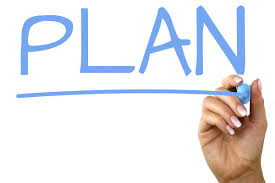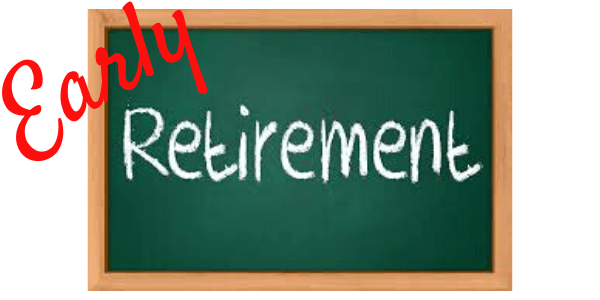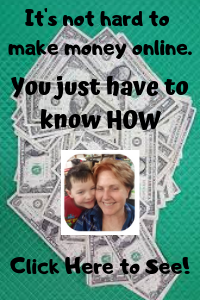The coronavirus has been devastating to the world in so many ways. People are dealing with illness, deaths, social isolation, and a historic economic downturn.
Many are being forced into early retirement due to Covid-19 right at a time when the stock market has substantially reduced their savings. So how do you get through it?
Everyone’s situation is different, but here are a few tips to help you get back on stable ground.
Understand Your Current Financial Status
 When I talk about understanding your current situation, many of you may be thinking, “I know my situation–I’m retiring sooner than I’ve prepared for, and it’s scary and stressful.”
When I talk about understanding your current situation, many of you may be thinking, “I know my situation–I’m retiring sooner than I’ve prepared for, and it’s scary and stressful.”
I can relate because of what happened with my husband and I a couple of years ago. I left my job at the post office with the plan to retire early and work on my online business, which was just getting on its feet.
However, about 4 months after that, my husband was laid off from his job, which was totally unexpected. Although he was able to find a good position a couple of months later, it paid roughly half the salary of his former job.
I made the decision to retire early based upon a financial outlook that had totally changed in a very short time. Many people are being forced into an early retirement due to Covid-19 and their situation is dire.
The stress and fear of not being able to pay our bills definitely took a toll, especially not having health insurance for a few months since we’re both in our 50s. But as dire as the situation looked at first, we got through it and learned a lot along the way.
One of the things we learned was that we had to get a realistic view of our finances to really understand our current status at that point in time.
==> Get Help With Your Debt — Call Now: 866-329-8809 <==
So you need to get all your financial records together and put all the numbers in front of you. Once you see everything in black and white, you’ll be able to make financial decisions based upon facts instead of emotion during a difficult time.
Here’s a list of items you’ll need to look at:
~ All of your monthly bills–Make sure you have current copies of the bills and don’t forget those they may be paid bi-monthly or quarterly. For bills that vary each month, such as your water or electric bill, look back over the last year so you know what to expect in high usage months.
~ All credit cards–You’ll want to make sure you know how much debt you’re carrying on each one and what the minimum payments are each month.
~ Medical bills–If you have any outstanding medical bills, you’ll need the current balances and how much you are paying each month.
~ Car insurance policies–In addition to the monthly premiums, you’ll need to know what the policies cover and the limits.
~ Life insurance policies–You’ll need the cost of premiums, and if you have any whole life policies, the cash value of each.
~ House payment–Break your house payment down into the principal, home insurance, and property taxes if you have an escrow account. You’ll also need to know how much you still owe and how many years are left on the loan.
~ Bank Accounts–You’ll need the current balances as well as checking account statements for the last year, if possible. Make sure you include any accounts with funds that are immediately accessible.
~ Retirement Accounts–This would include traditional IRAs, Roth IRAs, 401ks, basically any account that you’d have to pay a penalty on withdrawals before a certain age.
~ Brokerage and Non-Retirement Accounts–Do you have any stock or bond holdings? Anything that would take some time to liquidate into cash but isn’t tied to an early withdrawal penalty.
~ Miscellaneous Income or Assets–This might include funds from a pension payout, unemployment benefits, severance pay, a structured settlement, an inheritance coming, proceeds from a loan being paid back to you, etc.
The financial information you’ve gathered is going to be the basis for seeing where you stand right now and what your options are going forward.
==> Need Help to Settle Your Debt? Call Now: 866-329-8809 <==
Assess Your Needs
You’ll need to make a realistic assessment of what your needs are now and into the future. I like to put them into 3 categories:
- Monthly–These are the bills and expenses that you have each month.
- Yearly–These expenses will be coming due within the next 12 months.
- Future–These items may be farther off before coming due, but need to be planned for
~ Monthly–Write down every expense that will come due each and every month down to the penny. Make sure your figures are as accurate as possible and only estimate where necessary. Include groceries, clothing, school expenses, absolutely everything!
The best way to be sure you’re getting everything accounted for is to look at your checking account and credit card statements for the last year.
When my husband and I did this process a couple of years ago, I thought I had a good idea of how much we were spending each month and what we were spending it on. But when I had the statements in front of me, I was seriously underestimating how much money was going out for groceries and other miscellaneous small items that I would buy without much thought.
So be thorough and accurate!
~ Yearly–Any expense that you’re going to have to pay within the next year goes into this category. Spend some time really researching this one because these expenses can derail any good financial plan.
Back to school costs, dental visits, vehicle registrations–these types of expenses all need to be accounted for here.
A great example for us is vet bills for our dogs and cats. We recently took both German Shepherds and one cat to the vet for their shots and check ups. They’re all healthy, but our female dog has chronic ear problems and a brace for her torn CCL that needed to be checked.
After they all got their examinations, shots, nails clipped, ear drops, and 6 months worth of flea & tick and heart worm medications, we got a bill of $550 and still have one cat to go!
Another example is heating oil or propane. Most people fill their tank once or twice a year, and depending upon the price at the time, it can be several hundred dollars at a shot.
So as you’re looking through your statements, find these types of payments and include them in the yearly category.
~ Future–These expenses are usually large ticket expenses that have to be planned for or financed.
These can include things like buying or repairing a car, replacing large appliances or your furnace or air conditioner, putting a new roof on the house, sending a child to college, and many more.
While some of these types of expenses can be put off longer if needed, you’ll need a plan to be sure you can purchase others immediately.
If you live in the Midwest where we do and your furnace goes out in December, it’s not a question of how long you can go before replacing it. The question is how fast can the furnace guy get out there!
In general, I believe that most people can keep their cars a lot longer than they do, especially with good upkeep and maintenance. But even if repairs are much less than buying a new or used car, they can be costly.
I was a Rural Carrier with the Post Office and drove a Jeep to deliver the mail. Repairing it was much more cost effective than buying a new one. But when it needed a new engine, the cost was a hefty $5000 at one time!
As you can see, any solid financial plan needs to look into the future to be prepared!
Create Your Plan
 Now that you’ve got solid numbers in front of you, let’s put them into a plan!
Now that you’ve got solid numbers in front of you, let’s put them into a plan!
You have your financial needs listed out, the next step is looking at all of your options for paying for them. Everyone’s plan is going to be different, so you’ll need to see what works for you.
Do you have a lot of credit card debt that’s going to make it difficult to pay bills each month? Then paying off that debt needs to be a central part of your plan.
Is your house payment going to be difficult to pay now? You’ll need to decide if you want to stay in your house or downsize. If you want to stay, are you in a position to refinance to a lower payment?
What income sources are available to you in order to help with paying off the debt or refinancing? If you’re already 62, you can start getting your social security.
If you’re between 59 1/2 and 62, you can access your retirement accounts without a penalty. If you’re at least 55, you may still be able to access those accounts, but will need to check the current tax laws.
In our situation, we had a large house payment and credit card debt that needed to be reduced in order to become financially stable. We weren’t eligible to access any retirement accounts without penalty due to our age. But we did have one option–the 72t distribution.
Under the 72t distribution rule, you can take a sum out of one of your accounts each year for at least 5 years. You do have to pay any applicable taxes, but you won’t have to pay the early withdrawal penalty.
It needs to be the same amount each year, and you can’t add to or subtract any other funds during that time. You’re also limited by how much you can withdraw. Bankrate has a calculator you can use to find out how much you could take out.
In our case, we used the money from the 72t distribution to pay off enough debt to qualify for refinancing our house. After that, the distribution amount enabled us to get through until my husband’s salary started rising and my online business started making consistent money.
But what if you don’t have enough money to get where you want to be financially? I recommend creating another stream of income, and my favorite is perfect for retirees!
==> See the legitimate program where I learned to make money online <==
Create An Online Income Stream

Starting an online business is something any retiree can do and doesn’t require experience or large start-up costs. My favorite business model that I use is called Affiliate Marketing.
I now have 6 websites and make money consistently every month. They earn an income for me any time day or night, and I work on my business part time whenever it’s convenient.
Affiliate marketing is simply creating a website where you refer people to retail websites and make a commission if they buy anything. There’s no technical knowledge or experience needed.
Getting started in affiliate marketing is easy, and the income potential is truly unlimited! But with all the great benefits of this business, you do need to know that it takes time before you start making substantial, consistent income.
How much time? You can check out the following video for a general guideline:
Make Your Early Retirement A New Beginning
Retirement has always been the reward you get after working hard your whole life. But if you have to retire early due to Covid-19, it can be a source of stress and fear instead.
But by taking stock of your finances and making solid decisions to put you back on track, your retirement can still be a wonderful time to relax and enjoy your financial freedom!
Have you ever had to come back after a financial setback? Have you ever tried starting an online business? I’d love to hear about your experience and what you learned from it. Feel free to share in the comments below along with any questions you have!




Well! A lot of people actaully have been forever to leave their jobs and forced into retirement due to lack of provisional powers from their companies tto cope with the financial constraints that comes with the covid 19. Seeing all you have shared here, it really makes a lot of sense actually working and looking for a side hustle that can generate passive income too. Thanks
You’re welcome, and I’m glad you found the information helpful!
It’s very true that the corona virus has done a lot for harm to the world in general and this has been a very big thing for some countries because they don’t know yet how to deal with getting back from it. It has made people loose their jobs and now it’s making people retire early. Thanks for sharing
You’re welcome!
My father has been forced to retire early due to Covid 19 but he wasn’t planning to for a few years. He’s been stressing out about whether to find another job, which will be really difficult right now, or officially retire with the pension and funds he has. I think he needs to assess his needs and resources the way you’ve laid out, and then he’ll be able to make a good decision. Thanks!
Doing a detailed assessment with all of the information will give your father the ability to make his decision based on facts, and not based upon the stress of his situation. I’m glad you found the information helpful!
Hello Janelle,
Thank you for sharing. It is a very good article. I think everyone should not rely on their 9-5 jobs only due to different difficult times such as this year. Your suggestion about starting an online business is very inspiring. It is because we don’t need any experience or a large amount of initial investment. Therefore, everyone could easily start their online businesses and make stable incomes.
All the best,
Alex
No matter what your economic situation is, having an online business is another stream of income that can keep you financially independent. I know that having my websites definitely give us more security in our life!
Hello,
I enjoyed reading this.
You provided a lot of solid finanical advice set out clearly and easy to follow.
It’s very easy to panic when faced with early retirement especially just now when it’s such an uncertain time.
Being poor when you are older is a very scary thought as it’s much harder to be poor than in your younger days.
Listing all your outgoings can be an eye opener as it’s easy to spend a lot without realizing you are doing so. All those little purchases can really add up before you know it.
Best wishes,
Cameron
When we went through our last year’s bank statements, it was definitely a real eye-opener to see the amount of mindless spending that we had been pouring out of our account. Cutting out that unnecessary spending was instrumental in getting our bills paid and enabled us to live on a much smaller income.
I wish we had taken the time to really assess our spending habits a long time ago, and then we probably wouldn’t have been in as much debt in the first place!
It’s scary to think about retirement during times like this. People are retiring sooner than expected and the younger generation has barely worked for more than a year, some haven’t even set foot on something financially crucial for them. We’re aiming for something to keep us alive but sadly not everyone is gathered an early retirement. Crucial and hard times the ones we’re living in right now.
I agree with you that it’s scary to think about having to retire before you feel you’re ready. Hopefully this virus will be under control with a vaccine soon, and we can begin rebuilding the economy and job market.
Thank you for taking the time to share your thoughts!